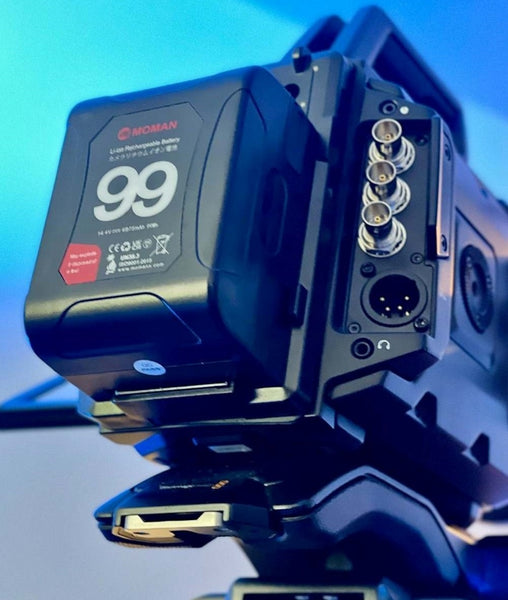Here we speak of camera lithium battery, it refers to the most commonly used rechargeable lithium-ion battery among professional photographers. It is utilized in video recording or studio photography for high-end devices. In this blog, we will introduce it from choosing to caring including three parts below:
- Basic Meaning: What is it and why do we need it?
- Choosing Ways: What’s the difference between types and kinds?
- Caring Methods: How to pursue longer use?

Get to know the camera lithium battery first!
What battery does a camera use and why do we need it you may ask. Let’s find the answer from its meaning and applications.
1. Brief definition
Camera lithium battery is a strong backing for photographers. Most digital cameras come with a battery pack and charger as standard equipment, but it’s also necessary for users to buy extra packs to be on the safe side in case of a power shortage brought on by prolonged outdoor shooting. One such kind is the Moman Power 99 v mount lithium battery, which is typically made up of several 18650 li-ion batteries and holds up to 40% more power.
2. Broad application
Many people who are new to photography can be scared by such a powerful battery and unsure about the cost or necessity of it. However, what we have to tell you is that there are also affordable options which have a high cost performance. They are small, light in weight, and incredibly energy-dense. It allows them to simultaneously charge numerous high-drain devices like filmmaking cameras, monitors, microphones, high-end studio LED lights as COLBOR CL100, and other suitable gear. Though pay more in price, what it brings you is long-term convenience.
Choose the best one for your specific need!
Because cameras require particular types of batteries, it is important to understand the merits and disadvantages of each. Make sure the one you choose or the new alternative is the right kind for your devices when making selection.
1. Is rechargeable or disposable better?
Nowadays, most cameras use rechargeable batteries like lithium-ion, while disposable batteries like AA or AAA are still used by some quarters. Since high-quality digital, SLR, and DSLR cameras require more power, those with a large capacity and a long lifespan are ideal. The film camera lithium battery is perfect for it because film cameras use less power and so have a smaller unit.
2. Gold mount battery VS v mount battery
Gold mount battery VS v mount battery, what's the difference and which is better? When you search for stronger solutions to run your camera together with a lot of accessories, you will find that there are just two mount options available on the market: v-mount / v-lock or gold mount. Which method suits you most eventually depends on personal preference. While some filmmakers might prefer the safety and accessibility of Gold Mounts at US rental facilities, others would like the global adaptability that comes with v mounts. It’s also a way to purchase converters that are compatible with either system if you wish to use both.

How to take daily good care of the rechargeable Li-ion battery pack?
No matter what kind you have, take daily good care of the v mount li ion battery will increase its life and allow you to get the utmost out of this little pack.
1. Suitable storage environment
Any batteries being stored for more than a month should be charged between 20% and 40 % and kept in a cold, dry environment. It’s import for owners to pay close attention to the temperature and humidity. The former requires 50°F/ 10°C, and the latter prefers about 50%, on account of preventing its quickly discharge at high temperatures, and short and overheat problems in the damp air.
2. Reduce unnecessary power loss
When rechargeable battery for camera is not in use, photographers typically switch their cameras off. But the truth is it would be preferable to leave it in sleep or standby mode for saving more energy. Besides, it is better to avoid studying the photos after each picture is taken As it consumes more power. Instead, it is preferable to examine the recorded. In addition, the camera's LCD screen contributes significantly to battery waste. In order to save its life, it’s suggested to lower the screen's brightness or use the viewfinder instead of the LCD screen.
3. Avoid complete battery self-discharge
The depth of discharge of li-ion cells like the v mount camera battery, affects how long they last. Its lifespan will be substantially extended if you can control minor discharges and maintain a charge between usage. It is protected from misuse in this condition, which is referred to as the sleep state.
Conclusion
Digital camera lithium battery for the video industry can be broadly divided into two categories, which often correspond to two different consumer types. Users could just need a power bank temporarily and not see it as a long-term investment. Alternately, you could spend money on it and have a high-quality camera rechargeable battery that lasts for years.
Nevertheless, in either way you need to consider components that are better able to tolerate electrical surges, stringent safety measures, high-capacity cells, and compact batteries.







